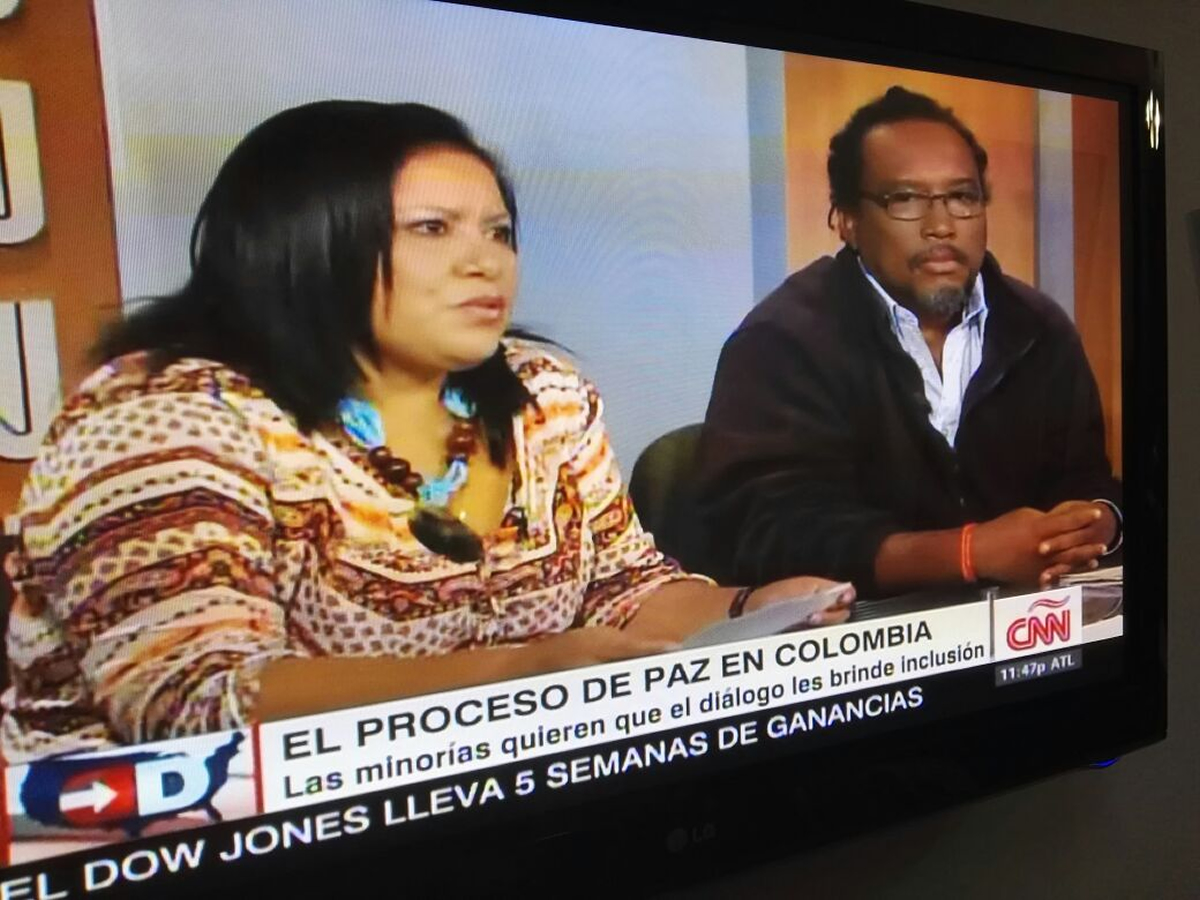Colombia’s Ethnic Commission for Peace and the Defense of Territorial Rights Visits Washington, D.C.
On March 18th and 19th, representatives of Colombia’s newly formed Ethnic Commission for Peace and the Defense of Territorial Rights visited Washington, D.C. to meet with policymakers, human rights advocates […]

On March 18th and 19th, representatives of Colombia’s newly formed Ethnic Commission for Peace and the Defense of Territorial Rights visited Washington, D.C. to meet with policymakers, human rights advocates and the media. The activists sought to promote the inclusion of Afro-Colombians and indigenous peoples in both the peace negotiations taking place in Havana, Cuba and the implementation of the forthcoming peace accords. Prior to the advocates’ arrival in Washington, the Ethnic Commission’s formation was officially announced on March 7th, in Bogota, Colombia. It represents the joining of two umbrella organizations, the National Indigenous Organization of Colombia (ONIC) and the National Afro-Colombian Peace Council (CONPA), that together represent hundreds of grassroots groups throughout Colombia.
The leaders came together to speak to the public about the peace process and Colombia’s ethnic groups, and to talk about the Commission’s agenda in Washington, Havana and Colombia.
Representing the National Indigenous Organization of Colombia, Arelis Uriana said that the United States and other countries that provide financial assistance to Colombia must demand that the Colombian government include the ethnic communities’ voices in the peace process. Uriana said that indigenous and Afro-Colombians should guide the process of implementation in their own territories because it is they who possess the knowledge needed to create a lasting peace. Uriana also underlined the importance of making the voices of Afro-Colombian and indigenous women’s voices heard. “It is women who have known the true pain of war,” Uriana said.
On behalf of CONPA and the Black Communities Process, Carlos Rocero explained the size of the challenge facing Afro-Colombians and indigenous peoples, noting that together they held 38% of Colombia’s land and represented 12.5% of the population. Rocero said that the number of Afro-descendant and indigenous victims in the armed conflict reached not into the thousands, but into the millions. Rocero spoke of Commission’s apprehensions about the peace process, including fears about the lack of adequate formal mechanisms to ensure a differential approach for Afro-Colombians and indigenous peoples, as well concerns about the primacy of a focus on individual victims rather than on the collective damage caused by the war. To address these concerns, he highlighted three concrete proposals put forth by the Commission: the addition to the peace accords of principles of interpretation and implementation for ethnic groups, concrete proposals as to the accords’ implementation and the creation of safeguards to protect the established rights of Afro-Colombians and indigenous peoples.
Marino Cordoba of CONPA and the National Association for Internally Displaced Afro-Colombians (AFRODES) spoke of CONPA’s broad coalition of nine national networks that group together hundreds of grassroots organizations as a demonstration of the Commission’s unquestionable legitimacy. Cordoba told of the advocacy efforts made by CONPA and the Commission, including the message he personally delivered to President Juan Manuel Santos during President Santos’ most recent visit to the US: that Colombia’s ethnic communities must be invited to Havana to make their voices heard. Cordoba reiterated the importance of finding partners in the international community and spoke of the important alliances built in support of the Commission’s cause, including fruitful discussions and partnerships with the US Embassy in Colombia, the US Agency for International Development, the US Congressional Black Caucus, the US Special Envoy to Colombia and the international development organization ACDI-VOCA.
Facing the difficult challenge of gaining meaningful participation in the peace process, the Commission’s members reiterated the importance of international solidarity with their cause and gave a positive evaluation of the progress made on their US visit, promising to keep up their work upon returning to Colombia. “We will keep on until we are included. Will not grow tired,” Cordoba said.
The International Institute on Race, Equality and Human rights strongly supports the work of the Ethnic Commission and fully agrees with the most recent statements by the UN Committee for the Elimination of Racial Discrimination in its concluding observations following its periodic review of Colombia, in which it recommends that the Colombian government guarantee that Afro-Colombians and indigenous are appropriately consulted during the peace negotiations and that their legitimate interests are taken into account.

